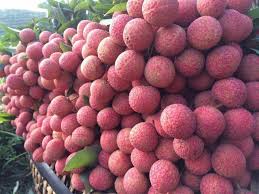
Photo for illustration (Source: vietnamnet)
According to the Commercial Affairs Office under the Vietnamese Embassy in Singapore, nearly 50 tonnes of lychee have been shipped to Singapore via Hai Phong Port so far, and the export volume is expected to reach 100 tonnes this year.
Thanks to its good quality and eye-catching appearance, the fruit has quickly won over local consumers, leaving shelves in many supermarkets empty after only two weeks.
It was sold at SGD5 (USD3.59) per kg in the first week under a promotion program, and SGD6 in the next week.
Tran Thu Quynh, Vietnamese Trade Counsellor in Singapore, said since early 2018, the office has worked with major Singaporean importers to introduce the fruit, and held working sessions with Singaporean experts in lychee preservation.
Over the past three years, the office has organised trips to Vietnam for Singaporean fruit importers, including FairPrice whose representatives directly examined Vietnamese lychee farms.
Since the beginning of this year’s lychee season, it has coordinated with the Vietnam Trade Promotion Agency and the Department of Industry and Trade of Bac Giang province, dubbed as the kingdom of lychee in Vietnam, to hold an online workshop promoting the fruit.
Quynh said the office plans to join hands with Bac Giang and Hai Duong provinces, and FairPrice to organise a Vietnamese lychee day in Singapore in the next crop.
With the support of Singaporean experts, it is designing leaflets introducing the fruit in English, she added.
In 2020, Bac Giang has 28,000 hectares of lychee, including over 160,000 hectares for harvesting, up 10,000 tonnes compared to the previous year.
The area of lychee produced according to VietGAP standard is estimated at 15,000 hectares with an output of 110,000 tonnes, accounting for 53 percent and 69 percent of the total, respectively.
As many as 80 hectares of lychee are planted under GlobalGAP practices with an estimated output of 500 tonnes to serve high-end markets.
Meanwhile, Hai Duong is now home to 9,700ha of lychee, mostly in Thanh Ha district with about 3,600ha and Chi Linh city with 3,900ha. The total lychee output is estimated at 45,000 tonnes this year. The early lychee harvest is estimated to be 20,000 tonnes and the main crop is about 25,000 tonnes.
Hanoi’s millennium-old bell named national treasure
A bronze bell dating back to the 10th century at Nhat Tao Communal House in Dong Ngac ward, Hanoi’s Bac Tu Liem district, was recently recognized as a national treasure.

Nhat Tao bell (Photo: qdnd.vn)
The bell is a unique antique and the only of its kind dating back to the Ngo Dynasty (10th century) that has been found in Vietnam so far.
Weighing 6kg, it is 32cm in height, 19cm in diameter in its mouth and has a 7cm-tall canon.
Words inscribed on the bell are one of the earliest script evidences of the period of autonomy in Vietnam’s history, helping with studying the country’s society at that time.
Meanwhile, its decorations reflect the quintessence of carving and bronze casting techniques of the time.
2,500 pigs imported from Thailand
Nearly 2,500 pigs were imported via the Lao Bao Border Gate in the central province of Quang Tri on June 30th night.
The pigs were imported from Thailand to supplement the domestic market's supply and repopulate herds.

Photo for illustration (Source: baodautu.vn)
Le Dinh Hue, Deputy Director of Region 3 Animal Health Division under the Department of Animal Health, said the quarantine of imported live pigs from Thailand was strictly controlled to prevent disease and ensure food safety.
The pigs were assessed by the Department of Animal Health for disease and food safety before being imported, said Hue.
They were also tested for diseases before arriving in Việt Nam and then clinically checked and placed in isolation areas for monitoring and sampling when arriving in the country to ensure food safety, he added.
Region 3 Animal Health Division said the Lao Bao Border Gate has carried out import procedures for nearly 5,800 gilts and more than 3,800 hogs.
The Ministry of Agriculture and Rural Development reported that enterprises had imported some 90,000 tonnes of pork since the beginning of the year to ensure the supply of pork for the domestic market.
Experts said the solutions deployed by the Ministry of Agriculture and Rural Development not only helped to reduce the price of pork in the market but also gradually met the supply of breeding pigs for the future./.